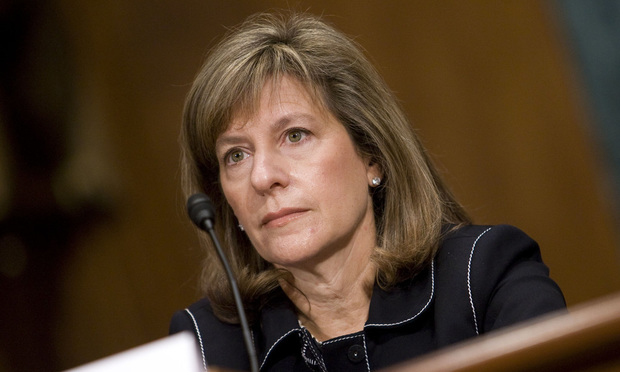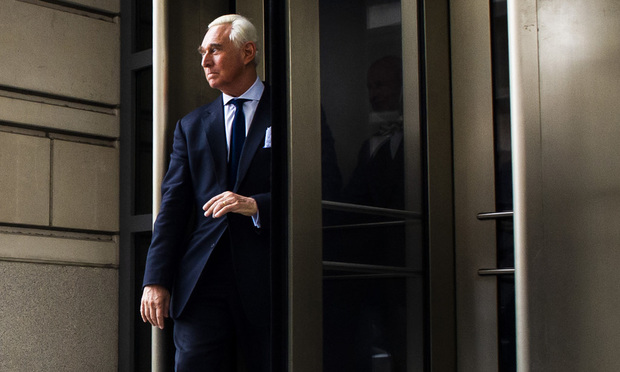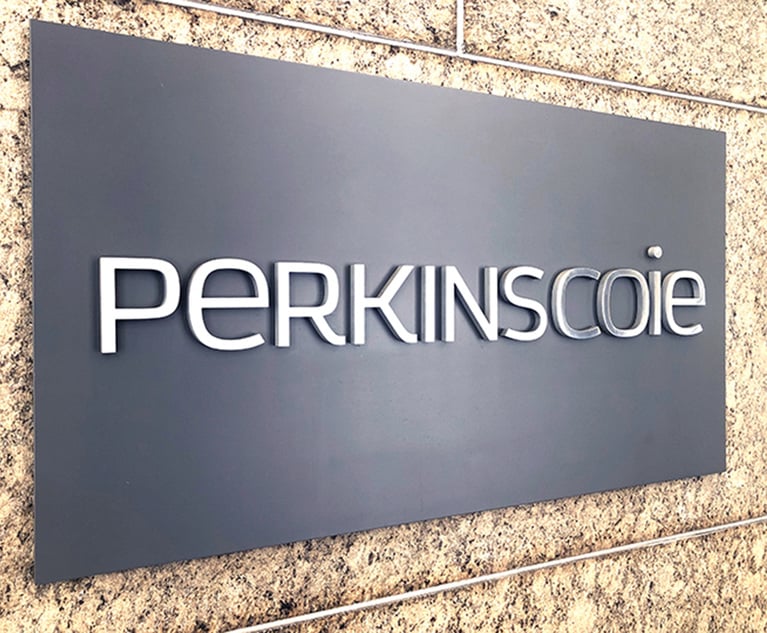Trump Tweets, Hidden Jurors and 'Public Enemy' Lyrics: Roger Stone's Bid for a New Trial Marches On
Judge Amy Berman Jackson spoke out against President Trump's tweets about Stone's case, warning they could result in the harm of jurors from his trial.
February 25, 2020 at 07:51 PM
9 minute read
 Amy Berman Jackson, 2010. Photo: Diego M. Radzinschi/The National Law Journal
Amy Berman Jackson, 2010. Photo: Diego M. Radzinschi/The National Law Journal
U.S. District Judge Amy Berman Jackson of the District of Columbia started off a Tuesday hearing on Roger Stone's bid for a new trial by reading out loud tweets from President Donald Trump alleging juror misconduct in the criminal case and later made a stunning announcement that the majority of the jury that Stone's lawyers and Trump now claim were tainted were just feet away in the jury room.
Hashtags referencing hip-hop group "Public Enemy" were described on the stand by the foreperson of Stone's jury, and she was asked to explain emojis she had posted on social media in the early morning hours before the Stone verdict came down. Even one of the prosecutors who withdrew from the case over Main Justice's interference in the sentencing recommendation briefly took the stand to describe some pretrial interactions between the trial team and Stone's defense counsel.
At the heart of the matter are social media posts from the foreperson of Stone's trial that negatively weigh in on the president. And Trump, in turn, has negatively weighed in on the foreperson—including with a tweet that landed during the middle of the hearing.
"There has rarely been a juror so tainted as the forewoman in the Roger Stone case. Look at her background. She never revealed her hatred of 'Trump' and Stone. She was totally biased, as is the judge," the president tweeted. Jackson did not specifically reference that tweet during the hearing.
Throughout the four-hour-long hearing, Jackson described a case that has become "unprecedented," laying out the harm she feared the jurors could face if they are further identified, due to the attention that's being drawn by the president to the case.
"I think without question then that this is a high publicized case, and in a highly polarized political climate in which the president himself has shone a spotlight on the jury through his Twitter platform … the risk of harassment and intimidation of any juror who may testify later this afternoon is extremely high," the judge said near the start of the hearing.
And she said she feared that, by potentially exposing further personal details about jurors' identities, "an individual who may be angry about Mr. Stone's conviction or other developments on the news may soon take it out on them personally."
Jackson announced that the rest of the hearing would be partially public: The courtroom would be sealed to all but the attorneys involved, Stone and immediate court personnel, but audio would be fed into the courthouse's media room and another courtroom.
She blocked anyone from saying any of the jurors' names and even their numbers from the trial, indicating that a supplemental sealed filing by the Department of Justice that morning had raised even more red flags for her.
Once the hearing began, one of the new Justice Department attorneys on the case, J.P. Cooney, said that he had supervised Stone's criminal prosecution within the U.S. Attorney's Office for D.C., which took over the case once special counsel Robert Mueller's probe ended.
And he described some of the office's internal workings, like who had access to juror questionnaires and how they were shared with Stone's defense counsel. Those efforts were apparently coordinated through Jonathan Kravis, who resigned from DOJ after Main Justice officials overrode his and the rest of the initial trial team's sentencing recommendation for Stone.
It was at that point that Michael Marando, one of the original Stone prosecutors who also withdrew from the case in protest, briefly became a witness in a case he had once prosecuted. "It's coming back to me now, a lot has happened," Marando said as he was asked to recall some interactions with defense counsel, but soon after he was dismissed.
Seth Ginsberg, whom Stone only recently added to his defense team ahead of sentencing, led the presentation of the arguments to Jackson. The judge at one point described the language in the filings in seeking a new trial as having an "accusative, harsh tone."
Ginsberg said he did not intend to offend the court; Jackson said she wasn't offended, but that it may have taken away from his arguments. "It may be the New York style," the judge said, referencing the state Ginsberg typically practices in, but acknowledged there are "plenty of D.C. lawyers" who do it too.
Stone attorney Robert Buschel also told Jackson that while the defense team had hired jury consultants ahead of the trial, they did not do any online searches for the individuals included in the potential jury pool. He said there were additional costs and logistics that went along with that kind of vetting, and that it "just didn't happen."
Jackson asked him if the defense team had access to the internet at the time. Buschel replied that he did.
Ginsberg and the judge also butted heads over the questioning of the juror during jury selection, after the lawyer suggested that the judge had stopped Buschel from questioning her further during voir dire.
Jackson, sounding increasingly frustrated, laid out exactly what had happened according to the transcript: The defense asked a question, prosecutors objected and Jackson rephrased it. Buschel then did not ask any more questions.
"I did not stop him," Jackson said, loudly and directly. Ginsberg said he misspoke.
 Roger Stone departs Federal Court after attending his arraignment hearing on Jan. 29, 2019. Photo: Diego M. Radzinschi / NLJ
Roger Stone departs Federal Court after attending his arraignment hearing on Jan. 29, 2019. Photo: Diego M. Radzinschi / NLJAfter hearing arguments from counsel from both sides, Jackson then presented a twist: She invited the entire Stone jury to the hearing, and 11 of them, including the foreperson at the heart of the matter, were in the nearby jury room.
And Jackson then called out two of the jurors to take the stand in the case they had delivered a verdict in, about the integrity of their fellow jurors.
After their testimony, Jackson said she felt no need to call any other jurors, after she had already suggested that she was deeply skeptical about Stone counsel's claims that the foreperson had shared outside information about the case with other jurors during the trial in violation of court orders.
The final person to appear on the stand was the foreperson of the trial. Jackson and Ginsberg both went through the social media posts with her, and at one point the judge questioned the relevancy of the lawyer's questions, noting they were posts about Trump and not Stone explicitly.
"Having an opinion of the president and some, maybe even all of his policies," Jackson said, didn't necessarily mean the foreperson could not fairly serve on the jury.
During her testimony, the foreperson pointed to an answer she gave on the juror questionnaire saying she did have opinions about those included on a list of people who may come up during the case, which included Trump.
She had also written on the form that she may have made social media posts about Stone, but that she didn't remember any specifically.
"I was trying to be honest," the foreperson testified. "I post and tweet a lot of stuff, I absolutely was not trying to downplay anything."
The testimony even veered into describing references to the rap group Public Enemy, over hashtags the foreperson had made on a post about Trump.
"What does 'Chuck D tried to tell us' mean to you?" Ginsberg asked the foreperson of a hashtag she wrote about the Public Enemy group leader. She explained that it related to another hashtag on that same post, the title track from one of the group's albums, "Fear of a Black Planet."
Tuesday's hearing was held just days after Jackson sentenced Stone to 40 months in prison. The judge had delivered a lengthy and passionate speech Thursday, highlighting the importance of upholding institutions created by the Constitutions, which she said Stone sought to undermine with the false statements that he was convicted of making.
However, she still sentenced him to less time than both the Justice Department and sentencing guidelines had suggested was appropriate.
Stone late Friday filed a motion to disqualify Jackson from overseeing his case, alleging that her statements on the "integrity" of his jury at his sentencing meant she could not fairly rule on his sealed motion for a new trial, which apparently involves allegations of bias against one juror.
Jackson quickly ruled against him, writing in a rare Sunday night opinion that "given the absence of any factual or legal support for the motion for disqualification, the pleading appears to be nothing more than an attempt to use the Court's docket to disseminate a statement for public consumption that has the words 'judge' and 'biased' in it."
That filing briefly came up during Tuesday's proceedings, with Jackson saying that she didn't hold it against Stone and his counsel.
Read more:
At Roger Stone's Sentencing, an Apology From the Justice Department
'Flagrant Disregard for the Institutions of Government': Stone Sentenced to Over 3 Years
'A Loss to the Pursuit of Justice': Praise for Roger Stone Prosecutor Who Resigned
The Hardest Thing About Being a Judge? What Courts Say About Sentencing.
This content has been archived. It is available through our partners, LexisNexis® and Bloomberg Law.
To view this content, please continue to their sites.
Not a Lexis Subscriber?
Subscribe Now
Not a Bloomberg Law Subscriber?
Subscribe Now
NOT FOR REPRINT
© 2025 ALM Global, LLC, All Rights Reserved. Request academic re-use from www.copyright.com. All other uses, submit a request to [email protected]. For more information visit Asset & Logo Licensing.
You Might Like
View All
Trump's DOJ Delays Releasing Jan. 6 FBI Agents List Under Consent Order
3 minute read
Judge Grills DOJ on Trump’s Birthright Citizenship Executive Order

Perkins Coie Backs Challenge to Trump's Ban on Transgender Military Service
4 minute read
Selendy Gay Files Lawsuit Challenging Trump's Workforce Reclassification EO
2 minute readTrending Stories
- 1ACC CLO Survey Waves Warning Flags for Boards
- 2States Accuse Trump of Thwarting Court's Funding Restoration Order
- 3Microsoft Becomes Latest Tech Company to Face Claims of Stealing Marketing Commissions From Influencers
- 4Coral Gables Attorney Busted for Stalking Lawyer
- 5Trump's DOJ Delays Releasing Jan. 6 FBI Agents List Under Consent Order
Who Got The Work
J. Brugh Lower of Gibbons has entered an appearance for industrial equipment supplier Devco Corporation in a pending trademark infringement lawsuit. The suit, accusing the defendant of selling knock-off Graco products, was filed Dec. 18 in New Jersey District Court by Rivkin Radler on behalf of Graco Inc. and Graco Minnesota. The case, assigned to U.S. District Judge Zahid N. Quraishi, is 3:24-cv-11294, Graco Inc. et al v. Devco Corporation.
Who Got The Work
Rebecca Maller-Stein and Kent A. Yalowitz of Arnold & Porter Kaye Scholer have entered their appearances for Hanaco Venture Capital and its executives, Lior Prosor and David Frankel, in a pending securities lawsuit. The action, filed on Dec. 24 in New York Southern District Court by Zell, Aron & Co. on behalf of Goldeneye Advisors, accuses the defendants of negligently and fraudulently managing the plaintiff's $1 million investment. The case, assigned to U.S. District Judge Vernon S. Broderick, is 1:24-cv-09918, Goldeneye Advisors, LLC v. Hanaco Venture Capital, Ltd. et al.
Who Got The Work
Attorneys from A&O Shearman has stepped in as defense counsel for Toronto-Dominion Bank and other defendants in a pending securities class action. The suit, filed Dec. 11 in New York Southern District Court by Bleichmar Fonti & Auld, accuses the defendants of concealing the bank's 'pervasive' deficiencies in regards to its compliance with the Bank Secrecy Act and the quality of its anti-money laundering controls. The case, assigned to U.S. District Judge Arun Subramanian, is 1:24-cv-09445, Gonzalez v. The Toronto-Dominion Bank et al.
Who Got The Work
Crown Castle International, a Pennsylvania company providing shared communications infrastructure, has turned to Luke D. Wolf of Gordon Rees Scully Mansukhani to fend off a pending breach-of-contract lawsuit. The court action, filed Nov. 25 in Michigan Eastern District Court by Hooper Hathaway PC on behalf of The Town Residences LLC, accuses Crown Castle of failing to transfer approximately $30,000 in utility payments from T-Mobile in breach of a roof-top lease and assignment agreement. The case, assigned to U.S. District Judge Susan K. Declercq, is 2:24-cv-13131, The Town Residences LLC v. T-Mobile US, Inc. et al.
Who Got The Work
Wilfred P. Coronato and Daniel M. Schwartz of McCarter & English have stepped in as defense counsel to Electrolux Home Products Inc. in a pending product liability lawsuit. The court action, filed Nov. 26 in New York Eastern District Court by Poulos Lopiccolo PC and Nagel Rice LLP on behalf of David Stern, alleges that the defendant's refrigerators’ drawers and shelving repeatedly break and fall apart within months after purchase. The case, assigned to U.S. District Judge Joan M. Azrack, is 2:24-cv-08204, Stern v. Electrolux Home Products, Inc.
Featured Firms
Law Offices of Gary Martin Hays & Associates, P.C.
(470) 294-1674
Law Offices of Mark E. Salomone
(857) 444-6468
Smith & Hassler
(713) 739-1250








